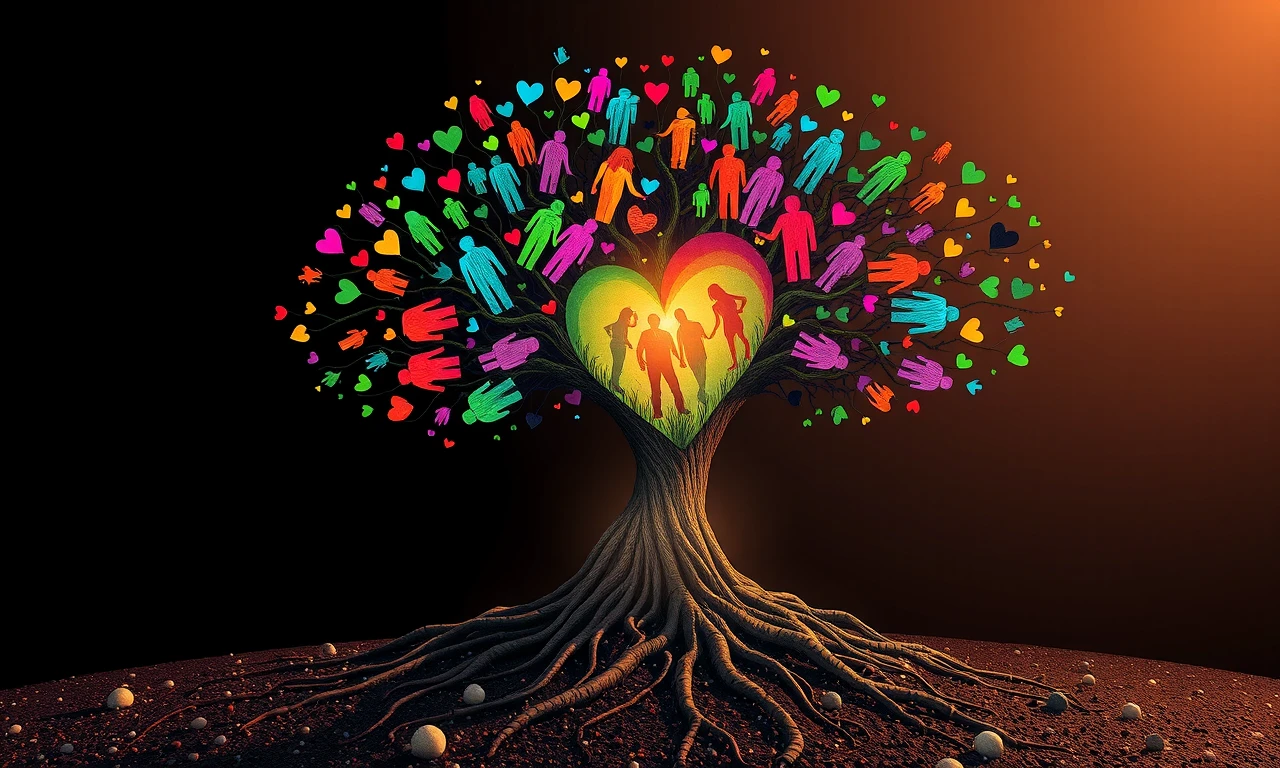In the intricate dance of relationships, recognizing red flags is crucial for safeguarding your emotional and mental health. These warning signs alert you to potential hazards, whether you’re dating or in a long-term partnership. From subtle cues to glaring issues, they often reveal deeper problems that may lead to toxic dynamics if ignored.
This article explores ten critical warning signs in women, empowering you to make informed decisions about your relationships. By understanding these indicators, you’ll be better equipped to foster healthier connections and protect your well-being. We’ll delve into behaviors like manipulation, control, and passive-aggressive tendencies, offering insights to help you navigate the complex terrain of love more safely and build emotional resilience.
Understanding the Importance of Recognizing Red Flags
Recognizing red flags in relationships is a crucial skill that safeguards your emotional well-being and fosters healthier connections. By honing this ability, you empower yourself to make informed decisions and navigate the complex landscape of romantic partnerships with greater confidence. Understanding these warning signs allows you to protect your mental health and prevent the development of toxic patterns that can erode your sense of self.
Here are key reasons why identifying red flags is essential:
- Preserves your self-esteem and personal boundaries
- Helps you avoid manipulative and controlling dynamics
- Encourages trust in your instincts and intuition
- Facilitates early intervention in potentially harmful situations
- Promotes the cultivation of mutually respectful relationships
- Prevents gaslighting and emotional abuse
- Aids in recognizing narcissistic tendencies
- Helps identify dishonest or deceitful behavior
By remaining vigilant and trusting your perceptions, you can discern between healthy quirks and concerning behaviors. This awareness empowers you to address issues proactively, seek support when needed, and make choices that align with your values and well-being. Remember, recognizing red flags is not about being overly critical, but rather about fostering self-respect and creating space for truly fulfilling connections.
Controlling Behavior and Manipulation
Controlling behavior and manipulation are insidious red flags that can erode healthy relationships. These tactics often manifest subtly, disguised as care for a partner’s well-being. Signs include constantly questioning whereabouts, isolating from friends and family, and making decisions without consultation. Manipulators employ guilt-tripping, emotional blackmail, or subtle threats to manipulate outcomes in their favor.
To recognize these patterns, pay attention to how you feel after interactions. Do you often doubt your perceptions or feel guilty for asserting your needs? This could indicate gaslighting – a form of emotional manipulation causing self-doubt and confusion.
The impact on personal autonomy can be severe. People in controlling relationships may find themselves unable to make simple decisions independently. This erosion of independence can lead to a loss of self-identity and confidence.
Beware of controlling tactics masquerading as care, such as excessive gift-giving to create obligation, or “helping” with tasks to foster dependency. These behaviors aim to control through seemingly benevolent actions, making them difficult to identify and address.
The biggest threat to personal autonomy in relationships is the gradual normalization of control. It’s like a slow-boiling pot – by the time you realize you’re in hot water, you’ve already lost sight of your boundaries.
Extreme Jealousy and Possessiveness
In the realm of love, a fine line separates healthy concern from possessive behavior. While a dash of jealousy can spice up a relationship, extreme manifestations act as a glaring red flag. Unhealthy jealousy stems from deep-seated insecurities, transforming affection into a suffocating embrace.
Signs of possessive behavior include incessant phone monitoring, social media surveillance, and unwarranted accusations. These actions erode trust, the bedrock of any healthy partnership. As personal freedom dwindles, the relationship morphs into a prison of constant suspicion and doubt.
The impact of extreme jealousy extends far beyond momentary discomfort. It can lead to isolation from friends and family, as the jealous partner seeks to monopolize attention. This irrational need for control often escalates, potentially veering into abusive territory.
Left unchecked, jealousy can spiral into more destructive behaviors. What begins as excessive texting may evolve into stalking or even physical confrontations. Recognizing these early warning signs is crucial for maintaining personal safety and emotional well-being.
To navigate this treacherous terrain, open communication is key. Address concerns calmly, setting clear boundaries. If volatile patterns persist, seeking professional help or reevaluating the relationship may be necessary. Remember, true love empowers, not imprisons. Be vigilant for signs of unstable, aggressive, or vindictive behavior, as these can indicate deeper issues. Stay attuned to your instincts and prioritize your well-being in the face of untrustworthy or inconsistent actions.

Consistent Disrespect and Boundary Violations
Respect forms the cornerstone of healthy relationships, acting as a safeguard against disrespectful behavior and boundary violations. When partners consistently disregard each other’s limits, it erodes trust and fosters resentment. Recognizing these red flags early can prevent long-term emotional damage.
Common boundary violations include:
- Invading privacy by snooping through personal belongings or devices
- Making important decisions without consultation
- Criticizing or belittling opinions and feelings
- Disregarding explicitly stated boundaries
- Pressuring for unwanted physical intimacy
- Exhibiting dismissive attitudes towards partner’s needs
- Frequently interrupting or talking over the partner
- Attempting to control the partner’s choices or friendships
These behaviors may escalate to more reactive forms of disrespect over time. Inconsistent treatment, where respect fluctuates based on mood or circumstances, can be equally damaging. Watch for entitled attitudes or confrontational responses to boundary-setting.
Tolerating persistent disrespect often leads to diminished self-esteem and a skewed perception of healthy dynamics. It can foster dependent behaviors, making it challenging to assert boundaries in the future. Moreover, unchecked disrespect may pave the way for more severe forms of sabotage or even physical harm.
Addressing violations promptly is crucial. Clearly communicate your limits and expectations, and be prepared to enforce consequences if they’re repeatedly ignored. Remember, mutual respect is non-negotiable in a thriving partnership. Stay vigilant for signs of immature or demanding behavior that may indicate deeper issues.
Gaslighting and Emotional Manipulation
Gaslighting, a particularly insidious form of emotional manipulation, erodes one’s sense of reality and self-trust. This red flag manifests through subtle tactics designed to make the victim question their own perceptions and memories. Manipulators employ phrases like “You’re too sensitive” or “That never happened” to sow seeds of doubt, gradually undermining their partner’s confidence.
Common gaslighting tactics include denying past events, trivializing emotions, and shifting blame. The manipulator may present false information with unwavering certainty, leaving the victim feeling confused and unstable. Over time, this dishonest behavior can lead to severe psychological distress, anxiety, and depression.
Gaslighting is the invisible thread that unravels the fabric of one’s reality, leaving behind a tapestry of self-doubt and confusion. It’s a competitive game where the victim always loses.
Recognizing gaslighting requires heightened awareness. Watch for patterns of contradiction between words and actions, frequent accusations of misremembering or overreacting, and attempts to isolate you from support systems. Trust your instincts when something feels amiss, as gaslighters often exploit passive-aggressive tactics to maintain control.
Responding to gaslighting involves setting firm boundaries, documenting incidents, and seeking external validation. Remember, a healthy connection fosters open communication and mutual respect, not confusion and self-doubt. If you find yourself constantly questioning your reality or facing unpredictable behavior, it may be time to reevaluate the situation and seek professional support to rebuild your self-esteem and mental well-being.
Be cautious of self-centered individuals who display defensive or unreliable traits, as these can be precursors to gaslighting behavior.
Constant Drama and Emotional Instability
In the whirlwind of romance, constant drama and emotional instability can quickly transform a promising relationship into a volatile roller coaster. These turbulent dynamics often manifest as extreme mood swings, frequent arguments over trivial matters, and an atmosphere of perpetual crisis. Partners may find themselves walking on eggshells, never knowing what might trigger the next outburst.
The impact of such instability on relationship well-being is profound. It erodes trust, creates chronic stress, and depletes emotional resources. Over time, this unpredictable environment can lead to anxiety, depression, and a pervasive sense of insecurity for both individuals involved.
While it’s normal for relationships to have ups and downs, persistent drama signals deeper issues. Healthy fluctuations involve occasional disagreements resolved through constructive communication. In contrast, reactive patterns of constant turmoil indicate an inability to manage emotions effectively.
Drama-seeking behavior often stems from unresolved personal issues or a need for attention. This approach can leave partners feeling drained and doubtful of their own perceptions. It’s crucial to recognize these patterns early and address them before they become destructive to both individuals’ well-being. Seeking professional guidance or counseling can be beneficial in navigating these turbulent waters and fostering a more stable, fulfilling connection.
Narcissistic Tendencies
Narcissistic tendencies in women can manifest as a complex web of behaviors that significantly impact relationships. These individuals often exhibit an inflated sense of self-importance, coupled with a deep-seated need for admiration and attention. Recognizing these traits early can help navigate potential pitfalls in romantic partnerships.
- Excessive focus on appearance and social media presence
- Difficulty accepting criticism or admitting fault
- Tendency to dominate conversations and redirect attention
- Lack of empathy for partner’s needs or emotions
- Obsession with social status and material possessions
- Frequent use of exaggeration or lies to bolster self-image
- Exploitative behavior in relationships for personal gain
- Intense envy of others or belief that others are envious of them
The impact of narcissism on relationships can be profound, often leading to emotional exhaustion and diminished self-worth for the partner. Narcissists may employ subtle manipulation tactics, such as gaslighting or love bombing, to maintain control and sabotage their partner’s autonomy.
Dealing with a narcissistic partner presents unique challenges. Their entitled attitude and defensive reactions to perceived slights can make constructive communication difficult. Partners may find themselves walking on eggshells, constantly adapting to avoid triggering confrontational or vindictive responses.
Recognizing these patterns is crucial for maintaining emotional well-being. While change is possible, it often requires professional intervention and a genuine commitment from the narcissistic individual. Remaining vigilant to these red flags can help individuals make informed decisions about their relationships and protect their mental health.
Lack of Accountability and Blame-Shifting
Accountability forms the bedrock of trust in any relationship. When one partner consistently dodges responsibility and shifts blame, it erodes the foundation of mutual respect and understanding. This red flag often manifests through subtle behaviors, such as deflecting criticism, making excuses, or portraying oneself as the perpetual victim.
The impact of blame-shifting on relationship dynamics can be profound. It creates an atmosphere of defensiveness, where open communication becomes increasingly difficult. Partners may find themselves walking on eggshells, reluctant to address issues for fear of triggering a defensive response. Over time, this pattern can lead to resentment, emotional distance, and a breakdown in intimacy.
True strength lies not in avoiding responsibility, but in embracing it as a pathway to growth and deeper connection. As Dr. John Gottman’s research suggests, couples who practice accountability cultivate trust and resilience in their relationships.
Recognizing the importance of accountability is crucial for fostering healthy relationships. It allows for genuine problem-solving, personal growth, and the development of trust. Partners who take ownership of their actions demonstrate maturity and a commitment to the relationship’s well-being.
Addressing lack of accountability requires patience and clear communication. Encourage self-reflection by modeling accountable behavior. Set boundaries around blame-shifting and express how it impacts you. If patterns persist, seeking couples therapy can provide tools for breaking unhealthy cycles and cultivating a more balanced, responsible dynamic. Remember, building accountability is a journey that requires commitment from both partners.
Inconsistent or Dishonest Communication
Communication serves as the lifeblood of any thriving relationship, yet inconsistency and dishonesty can swiftly erode the foundation of trust. This red flag manifests in various forms, from subtle half-truths to blatant fabrications. Partners may notice discrepancies in stories, frequent “white lies,” or a tendency to withhold crucial information.
Signs of inconsistent communication include sudden changes in tone or behavior, contradictory statements, and a pattern of broken promises. These behaviors often stem from fear of conflict, a desire to maintain control, or deep-seated insecurities. Over time, such patterns can create an atmosphere of doubt and suspicion, undermining the very essence of intimacy.

The impact of dishonesty on trust is profound and far-reaching. It creates emotional distance, fosters resentment, and can lead to a cycle of reciprocal deception. Once trust is broken, rebuilding it requires significant effort and time from both parties.
To promote open dialogue, establish a safe space for honest communication without fear of judgment. Encourage transparency by modeling vulnerability and practicing active listening. Address concerns promptly and compassionately, avoiding demanding or accusatory language. Remember, fostering honesty often requires patience and understanding, especially when dealing with immature or deceitful tendencies rooted in past experiences.
Excessive Dependency or Clinginess
Excessive dependency in relationships can manifest as an unhealthy attachment that stifles individual growth and autonomy. Unlike healthy bonds built on mutual support, clinginess often stems from deep-seated insecurities and fear of abandonment. This behavior can suffocate personal space and erode individuality, leading to an imbalanced dynamic where one person becomes responsible for the other’s emotional stability.
- Constant need for reassurance and validation
- Difficulty spending time apart or pursuing separate interests
- Overwhelming anxiety when partner is unavailable
- Excessive texting or calling throughout the day
- Reluctance to make decisions without partner’s input
- Intense jealousy or suspicion of partner’s other relationships
- Fear of expressing differing opinions or preferences
- Neglecting personal goals and aspirations
The roots of dependency often trace back to childhood experiences, unresolved trauma, or low self-esteem. Recognizing these patterns is crucial for fostering healthier connections. To maintain independence while nurturing intimacy, focus on developing personal hobbies, maintaining separate friendships, and setting clear boundaries. Encourage open communication about needs and concerns, while supporting each other’s growth and autonomy. Remember, a strong relationship thrives when two whole individuals choose to share their lives, not when one becomes a mere extension of the other.
By cultivating self-awareness and addressing underlying insecurities, individuals can break free from red flag behaviors and build more balanced, fulfilling partnerships. It’s essential to remain vigilant against attitudes that may arise from insecurity, as these can further strain the relationship dynamic.
Inability to Handle Conflict Constructively
Conflict is inevitable in any relationship, but the ability to navigate disagreements constructively is crucial for long-term harmony. When partners lack effective conflict resolution skills, it can lead to a cycle of unresolved issues and growing resentment. Signs of poor conflict management include stonewalling, escalating arguments, resorting to personal attacks, or avoiding confrontation altogether.
The impact of destructive conflict patterns on relationships can be severe, eroding trust and intimacy over time. Couples who struggle with healthy dispute resolution often find themselves trapped in a cycle of negativity, unable to move past recurring issues. This pattern can lead to emotional disconnection and, ultimately, relationship breakdown.
Conflict in relationships is like a dance – it’s not about avoiding stepping on each other’s toes, but learning to move together gracefully when it happens. Just as dancers practice to improve their coordination, couples can develop skills to navigate disagreements more effectively.
Developing constructive conflict resolution skills is essential for relationship longevity. Strategies include active listening, using “I” statements to express feelings, focusing on the issue at hand rather than past grievances, and taking breaks when emotions run high. Practicing empathy and seeking to understand your partner’s perspective can transform conflicts into opportunities for growth and deeper connection.
By cultivating these skills, couples can turn potential red flag behaviors into strengths, fostering a resilient and thriving partnership built on mutual understanding and respect. Regular practice and commitment to improvement can significantly enhance a couple’s ability to navigate challenges together.
Moving Forward with Awareness
Recognizing red flags is the first step towards healthier relationships. Self-reflection guides us through the landscape of emotions and behaviors, empowering us to break free from destructive patterns and foster genuine connections. Cultivating self-awareness allows us to identify and address concerns proactively.
Addressing issues in existing relationships demands courage and open communication. Approach conversations with empathy, focusing on specific behaviors rather than making accusations. Change requires patience and commitment from both parties, as well as a willingness to grow together.
When challenges persist or emotional distress escalates, professional guidance can offer invaluable insights. Therapists provide a neutral perspective, helping navigate complex dynamics and heal underlying wounds. Their expertise can equip couples with effective tools for resolving conflicts and strengthening their bond.

Ultimately, awareness illuminates the path to authenticity and fulfillment. By remaining vigilant and proactive, we cultivate connections that nurture our well-being and inspire mutual growth, creating a foundation for lasting happiness and understanding.
Frequently Asked Questions About Red Flags in Women
What should I do if I recognize multiple red flags in my current relationship?
If you spot multiple red signs, prioritize self-care. Seek input from trusted friends or family. Consider counseling for clarity and coping strategies. Communicate concerns calmly, setting clear boundaries. If issues persist, focus on your well-being and reevaluate the relationship's future.
Are there cultural differences in what's considered a red flag in relationships?
Cultural norms significantly shape relationship red flags. What's unacceptable in one society might be standard in another. Public displays of affection, financial independence, and gender role expectations vary widely across cultures, influencing relationship dynamics and perceived warning signs. Understanding these differences is crucial for cross-cultural relationships.
Can a person change their behavior if they exhibit red flags?
Yes, individuals exhibiting red flag behaviors can change with genuine self-awareness, commitment, and often professional help. Transformation requires acknowledging harmful patterns, understanding their roots, and actively developing healthier coping mechanisms. Success hinges on sustained effort, willingness to grow, and consistent application of new skills learned.
How do I approach a conversation about red flags with my partner without causing conflict?
Approach conversations empathetically and without judgment. Choose calm moments to express concerns using "I" statements, focusing on specific behaviors. Listen actively to your partner's perspective, seeking solutions together. If needed, consider professional guidance for constructive dialogue. Maintain a non-accusatory tone throughout the discussion.

Jeffrey Young is an American psychologist renowned for developing schema therapy. He founded the Schema Therapy Institute and is a leader in the field of cognitive behavioral therapy. Young has authored several influential books, including Schema Therapy for professionals and Reinventing Your Life for the general public.







